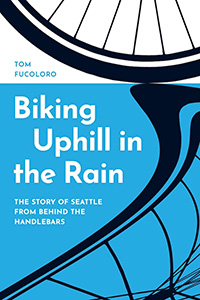
You just flew into Seattle, made your way through the airport and sat down on the light rail heading towards your hotel. You heard biking in Seattle is awesome, and you want to try it out. So you Google “bike rental seattle” and find a handful of shops, some sad news about the closure of Pronto and one service that claims it will bring a bike to you within two hours of booking: Pedal Anywhere. Better yet, the rates are even better if you keep the bike for your whole week stay.
So you book a bike online. By the time you are checked into your hotel and settled into your room, a quality hybrid bike in your size is in the lobby waiting for you. And the best part is that the person delivering it brought your bike using a custom e-assist bike. Bikes delivering bikes, that’s just too cool.
This is not just the concept behind Pedal Anywhere, it’s how the service actually works today in Seattle. The company, under the leadership of CEO (and friend of Seattle Bike Blog) Zach Shaner, is currently trying to grow using a crowdfunding-style investment effort through Seed Invest. That campaign is open until April 24. The minimum investment is $500 (but unlike with a Kickstarter-style crowdfunding, you would actually own a stake in the company).
“We’re trying to take all the headaches out the bike rental process,” said Shaner. And if it works in Seattle, why not replicate it other cities?
“If we [meet our investment goal], we’d like to be in Portland and Vancouver, B.C., and maybe San Francisco by next year.” (more…)














